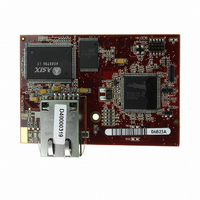20-101-1067 Rabbit Semiconductor, 20-101-1067 Datasheet - Page 93

20-101-1067
Manufacturer Part Number
20-101-1067
Description
MODULE RABBITCORE RCM3305
Manufacturer
Rabbit Semiconductor
Datasheet
1.20-101-1068.pdf
(160 pages)
Specifications of 20-101-1067
Module/board Type
MPU Core Module
Product
Microcontroller Modules
Flash
512 KBytes
Timers
10 bit
Operating Supply Voltage
3.15 to 3.45 V
Board Size
47 mm x 69 mm x 22 mm
For Use With/related Products
RCM3305
Lead Free Status / RoHS Status
Lead free / RoHS Compliant
Other names
316-1113
Available stocks
Company
Part Number
Manufacturer
Quantity
Price
- Current page: 93 of 160
- Download datasheet (4Mb)
The Prototyping Board comes with the basic components necessary to demonstrate the
operation of the RCM3305/RCM3315. Four user LEDs (DS3–DS6) are connected to
alternate I/O bus pins PA0–PA3 pins of the RCM3305/RCM3315 module via U8, and may
be driven as output indicators when controlled by PE7 and PG5 as shown in the sample
applications. Two switches (S2 and S3) are connected to PG0 and PG1 to demonstrate the
interface to the Rabbit 3000 microprocessor. Reset switch S1 is the hardware reset for the
RCM3305/RCM3315.
The Prototyping Board provides the user with RCM3305/RCM3315 connection points
brought out conveniently to labeled points at J8 and J9 on the Prototyping Board. Although
locations J8 and J9 are unstuffed, 2 × 17 headers are included in the bag of parts.
RS-232 and RS-485 signals are available on screw-terminal header J14, quadrature decoder
inputs are available on screw-terminal header J5, and digital inputs are available on screw-
terminal header J6. A 1 × 5 header strip from the bag of parts may be installed at J12 for four
sinking digital outputs. The clocked Serial Port B signals from the RCM3305/RCM3315
are used for the serial flash, and cannot be accessed via header J13 on the Prototyping
Board.
If you don’t plan to use the LCD/keypad module, additional signals may be brought out on 1 × 5
and 1 × 8 headers from the bag of parts that you install at J15 and J16. If you don’t plan to use
the stepper-motor control option, additional CMOS outputs are available via a 1 × 8 header
that you install at J10.
There is a through-hole prototyping space available on the Prototyping Board. The holes in
the prototyping area are spaced at 0.1" (2.5 mm). +3.3 V, +5 V, and GND traces run along
one edges of the prototyping area. Small to medium circuits can be prototyped using point-
to-point wiring with 20 to 30 AWG wire between the prototyping area, the +3.3 V, +5 V, and
GND traces, and the surrounding area where surface-mount components may be installed.
Small holes are provided around the surface-mounted components that may be installed
around the prototyping area.
B.4.1 Adding Other Components
There are two sets of pads for 6-pin, 16-pin, and 28-pin devices that can be used for sur-
face-mount prototyping devices. There are also pads that can be used for SMT resistors
and capacitors in an 0805 SMT package. Each component has every one of its pin pads
connected to a hole in which a 30 AWG wire can be soldered (standard wire wrap wire can
be soldered in for point-to-point wiring on the Prototyping Board). Because the traces are
very thin, carefully determine which set of holes is connected to which surface-mount pad.
User’s Manual
87
Related parts for 20-101-1067
Image
Part Number
Description
Manufacturer
Datasheet
Request
R

Part Number:
Description:
COMPUTER SGL-BRD BL2500 29.4MHZ
Manufacturer:
Rabbit Semiconductor
Datasheet:

Part Number:
Description:
COMPUTER SGL-BRD BL2500 29.4MHZ
Manufacturer:
Rabbit Semiconductor
Datasheet:

Part Number:
Description:
DISPLAY GRAPHIC 12KEY PROG OP670
Manufacturer:
Rabbit Semiconductor
Datasheet:

Part Number:
Description:
DISPLAY GRAPHIC 12KEY ETH OP6700
Manufacturer:
Rabbit Semiconductor
Datasheet:

Part Number:
Description:
COMPUTER SINGLE-BOARD BL2030
Manufacturer:
Rabbit Semiconductor

Part Number:
Description:
COMPUTER SGL-BOARD ETH BL2010
Manufacturer:
Rabbit Semiconductor

Part Number:
Description:
MODULE OP6810 W/O ETH/MEM EXPANS
Manufacturer:
Rabbit Semiconductor
Datasheet:

Part Number:
Description:
COMPUTER SINGLE-BOARD BL2020
Manufacturer:
Rabbit Semiconductor

Part Number:
Description:
COMPUTER BL2010 W/FRICTION LOCK
Manufacturer:
Rabbit Semiconductor

Part Number:
Description:
COMPUTER BL2020 W/FRICTION LOCK
Manufacturer:
Rabbit Semiconductor

Part Number:
Description:
COMPUTER SGL-BRD BL2500 44.2MHZ
Manufacturer:
Rabbit Semiconductor
Datasheet:

Part Number:
Description:
COMPUTER SGL-BOARD FULL BL2000
Manufacturer:
Rabbit Semiconductor

Part Number:
Description:
COMPUTER SINGLE-BOARD BL2110
Manufacturer:
Rabbit Semiconductor

Part Number:
Description:
COMPUTER SGL-BRD 29.4MHZ BL2610
Manufacturer:
Rabbit Semiconductor
Datasheet:

Part Number:
Description:
INTERFACE OP6800 512K FLASH&SRAM
Manufacturer:
Rabbit Semiconductor
Datasheet:











